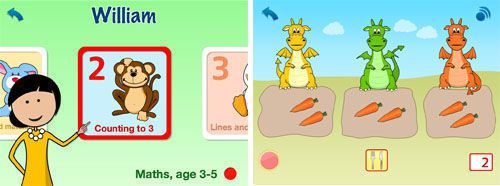Language learning in UK schools: what does the future hold?
Recent news that the numbers of pupils taking a modern foreign language to A-level in the UK have fallen dramatically did not come as a huge surprise to me. According to the latest A-level results, there has been a 9.9% fall in candidates taking French, and an even more depressing 11.1% fall in those taking German A level.
This trend has been coming along for quite some time now, but why?
First and foremost, the general attitude to language learning at a societal and educational level is very poor. To native English speakers, languages are often seen as a ‘waste of time’, as ‘everyone speaks English’. Well, allow me to dispel that notion! Although there are a lot of fantastic English speakers out there, only 22% of Spaniards, 39% of French people and 34% of Italians (for example) can speak English to a conversational level. The rates are higher in Scandinavian countries, but by no means everyone even has a basic command of English, let alone full fluency. The idea that it is ‘useless’ is even more ridiculous – even if other people do speak great English, that’s no excuse for being the person pointing at things mutely on holiday, let alone for UK politicians and businesspeople refusing to communicate with business partners and policial allies in their own tongue.

Secondly, languages are not taught well in many of our schools, and are not particularly encouraged. I was lucky enough to study French, German, Spanish and Japanese at GCSE, but there are many schools that only offer French, and even this is not compulsory. Languages are portrayed as difficult and often seen as being less necessary than maths, science etc. Whilst of course maths and science are vital, languages are essential to communication at every level, whether that is your holiday to France or a financial deal between Germany and the UK. Children also don’t start learning a language until they are around 12, when the best years for natural language absorption are coming to an end, and when teens often become self conscious about speaking a new language in front of school friends. I know I was very nervous about my oral exams at school, and still struggle to be very chatty in another language when I know I might make mistakes!
Here at EuroTalk we know that languages are not only essential but also loads of fun! So what’s the solution? Fortunately it seems that GCSE uptake of languages is on the increase, so maybe there is still hope. But from my perspective we need to introduce languages at a much earlier age in schools, offer a wider range of languages such as Mandarin and Arabic (both official UN languages), create a more open culture of chatting in another language without feeling embarrassed and worried about mistakes, and dispel the ridiculous notion that any other language than English is useless. Even if everyone else in the world learns English, we should be ashamed not to return the favour and at least have a go at saying ‘hi’ in their mother tongue.
Alex
Lost in translation: making sense of maths
Reading Nat’s post about all the fascinating linguistic differences and difficulties that she and her translators experienced when translating the new uTalk app, I was reminded of some of the similar issues we’ve had in localising the maths apps. What seems totally normal to a three-year-old in the UK might not be all that familiar to a kid in Malawi, for a start! Not to mention the fact that (unfortunately for us English speakers), not all languages follow our grammar rules. Here are a few of the cultural and language localisation issues we’ve come across recently…
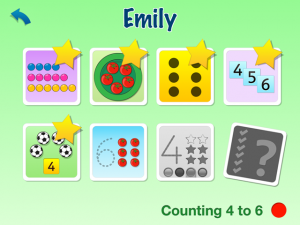 In Swedish, there were a couple of interesting language differences, for example: you cannot use the same word for ‘height’ in Swedish for an object such as a house as for a person (Välj det Längsta barnet – choose the tallest child, but Välj det högsta trädet – the tallest tree), whereas in English we can say short or tall regardless of the object.
In Swedish, there were a couple of interesting language differences, for example: you cannot use the same word for ‘height’ in Swedish for an object such as a house as for a person (Välj det Längsta barnet – choose the tallest child, but Välj det högsta trädet – the tallest tree), whereas in English we can say short or tall regardless of the object.
In Malawi, some of the ‘everyday’ objects featured in the apps probably seemed more than a little strange. In fact, Chichewa is strongly based on words for things that people see and encounter in daily life. Our translator had to get a bit creative and come up with ‘equivalent’ names for objects such as a robot (a doll in the Chichewa version), a turnip (a potato in the app), a dragon (she had to use a description meaning ‘a fierce animal’) or a fridge (replaced by a cupboard). There are also many more ‘technical’ words which don’t exist in traditional Chichewa, such as shapes. These are therefore normally given English names with a slight Chichewa accent (sikweya, trayango, rekitango and so on).
This is quite similar in Wolof: many items simply do not have a name in Wolof, or the words are unfamilar to most young people. Many items are therefore named in French instead, such as animals (giraffe), shapes (cercle) or fruits (banane). Above about 10, Wolof-speakers also tend to revert to French numbers instead of the more complex Wolof system (similar to the Chichewa – 5 and 1, 5 and 2…).
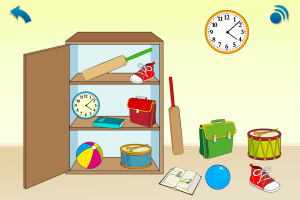 As with the uTalk app, Polish proved an especially problematic language for us too. One of the biggest issues was that in Polish the word for ‘you’ is dependent on gender. The translator mainly dealt with this by saying ‘we’ (e.g. Nauczyliśmy się/robiliśmy – we learned/were learning how to…), rather than addressing the child playing the app as male or female. It is also not usual to use prepositions such as ‘inside’ and ‘outside’ when describing the location of an object. e.g. instead of saying ‘the book is outside the cupboard’, Poles would normally say ‘the book is not in the cupboard’. Similarly to many other languages, some of the objects were also not very familiar: a cricket bat is not a well-known object, so it was translated as kijek – a little bat, and mangoes were translated as owoce – a fruit, as mangoes are not a ‘usual’ fruit in Poland – the same was the case with the Hungarian app, where we translated mango as gyumolc – also a generic word for fruit.
As with the uTalk app, Polish proved an especially problematic language for us too. One of the biggest issues was that in Polish the word for ‘you’ is dependent on gender. The translator mainly dealt with this by saying ‘we’ (e.g. Nauczyliśmy się/robiliśmy – we learned/were learning how to…), rather than addressing the child playing the app as male or female. It is also not usual to use prepositions such as ‘inside’ and ‘outside’ when describing the location of an object. e.g. instead of saying ‘the book is outside the cupboard’, Poles would normally say ‘the book is not in the cupboard’. Similarly to many other languages, some of the objects were also not very familiar: a cricket bat is not a well-known object, so it was translated as kijek – a little bat, and mangoes were translated as owoce – a fruit, as mangoes are not a ‘usual’ fruit in Poland – the same was the case with the Hungarian app, where we translated mango as gyumolc – also a generic word for fruit.
In Portuguese, there is no real way to distinguish between ‘more’ and ‘most’ or ‘less’ and ‘least’. Mais means both more and most, and menos less/least/fewer/fewest. This is also the case in Welsh: ‘bigger’ and ‘biggest’ translate to mwy and mwyaf respectively, but ‘more’ and ‘most’ also translate to mwy and mwyaf. The same goes for ‘smaller’/’smallest’ and ‘less’/’least’ (llai, lleiaf). On the other hand, there are different words for top and bottom shelves. Generally ‘top’ and ‘bottom’ are top and gwaelod but ‘top shelf’ and ‘bottom shelf’ are silff uchaf and silff usaf.
I was also intrigued to find out that in Amharic (an African language spoken in Ethiopia), they have a completely different system for telling the time: ‘1 o’clock’ does not mean lunch time, it in fact means ‘the first hour of the day’, i.e. when the sun comes up, and the rest of the day is counted from there. In fact, “Telling the time’ has been one of the hardest topics to localise, as our ideas of what happens at what time are not exactly international. Our French translator not only found the idea of eating a boiled egg for breakfast rather funny, but also pointed out that schools finish at 5 in France, not 3 as in the app, and a child would eat dinner at 7 or 8, not at 5 or 6! In Spain this is even funnier, as Spanish children regularly eat their dinner at 9 p.m., and go to sleep at 10 p.m. or perhaps later at the weekend or on holiday.
These are just a few of the language and cultural issues we’ve encountered on the maths translation project, and there are sure to be more! We have 10+ new languages ready to be released, and many more in the pipeline, so watch this space!
Alex
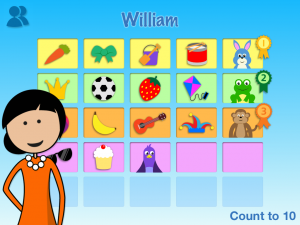 The maths apps are available from the App Store: Maths, age 3-5 and Maths, age 4-6.
The maths apps are available from the App Store: Maths, age 3-5 and Maths, age 4-6.
And also now available (in English only for the time being), Counting to 10, our first maths practice app, is on sale in the iTunes App Store for iPhone, iPod touch and iPad, and Google Play, for Android devices.
So, did you know you can speak Greek?
Today’s blog post is written by Konstantia Sotiropoulou, who’s been helping us to translate and record our Maths apps in Greek.
I bumped into the picture below a while ago and I thought this should be interesting. Undoubtedly, Greek is one of the richest languages in the world and is distinguished by an extensive vocabulary. In the past, the Guinness Book of Records ranked the Greek language as the richest in the world with 5 million words and 70 million word types!
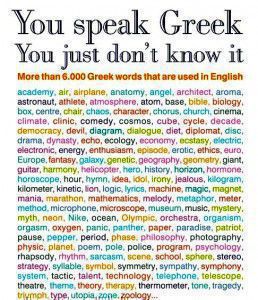
The front cover of You speak Greek, You just don't know it, a book by Annie Stefanides (Ianos, 2010)
Well, many of these words have been widely borrowed into other languages, including English. Greek roots are often used to coin new words for other languages, especially in the sciences and medicine. Mathematics, physics, astronomy, democracy, philosophy, athletics, theatre, rhetoric, baptism and hundreds of other words are Greek. Moreover, Greek words and word elements continue to be productive as a basis for coinages: anthropology, photography, telephony, isomer, biomechanics, cinematography, etc. and form, with Latin words, the foundation of international scientific and technical vocabulary, e.g. all words ending with –logy (“discourse”). Interestingly, an estimated 12% of the English vocabulary has Greek origin. Greek has contributed to English in several ways, including direct borrowings from Greek and indirectly through other languages (mainly Latin or French).
In a typical 80,000-word English dictionary, about 5% of the words are directly borrowed from Greek; this is about equivalent to the vocabulary of an educated speaker of English (for example, “phenomenon” is a Greek word and even obeys Greek grammar rules as the plural is “phenomena”). However, around 25% are borrowed indirectly. This is because there were many Greek words borrowed in Latin originally, which then filtered down into English because English borrowed so many words from Latin (for example, “elaiwa” in Greek evolved into the Latin “oliva”, which in turn became “olive” in English).
Greek and Latin are the predominant sources of the international scientific vocabulary. Greek is often used in coining very specialized technical or scientific words, however, so the percentage of words borrowed from Greek rises much higher when considering highly scientific vocabulary (for example, “oxytetracycline” is a medical term that has several Greek roots).
In education, an excellent way to build vocabulary is teaching students how to find roots in words. Since many words have their base in the Greek language, beginning with the roots from this ancient language is a good place to start. This list of English words with Greek origin will give students a basis for further exploration into the roots of the English language.
Now you that you have seen how many Greek words you know, I am going to teach you some more common ones like “kalimera” which means “good morning”, “Ya sou” which means “hi”, “Me lene” which means “my name is” and “efharisto” which means “thank you”. And if you are interested in learning more and discovering how many you already know, try EuroTalk’s uTalk Greek app.
And who am I to be talking about the Greek language? I am the Greek intern of EuroTalk, who translated and recorded into Greek their new Maths apps for young children. An interesting and fun experience for a young translator like me. I have to say that I really enjoyed working in this office, which gives you the sense of a family home. People here are calm and friendly, the kitchen is fully equipped with all kinds of snacks and during the day we get to listen to nice music while working! How amazing is that?
I started towards the end of January by translating the scripts of the app and soon after I recorded the first topics. I caught myself playing the app more than I needed to, as the games are really fun! I am sure young kids will truly enjoy it while learning basic Mathematics rules. And I know that my three-year-old niece, who will be playing the app in a few weeks, will at least have a constructive and educational first contact with technology!
So, whether you want to take up a new language or help your child have a nice start with Maths, you know that EuroTalk is here for you!
* There is an interesting video on YouTube that explains the History of English and the influence that it had from other languages!
Konstantia
A visit to Malawi
I visited Malawi for a week last month. My first impressions were the enthusiasm and happiness shown by so many Malawians. But real problems are just under the surface. For example, a serious petrol shortage means at least eight-hour waits at petrol stations.
During my visit, we installed gadgets (iPod touches) in two locations:
Primary school
Here we supplied the iPods to ten Standard 1 and 2 teachers (the first two years of Primary education) in a primary school with 5,000 children. Each teacher has a class of more than 250 children. The whole school has 24 teachers – including the head and deputy. The deputy head is paid £80 a month – and needs to spend £40 a month on rent. He has to buy everything for his children and extended family on £40 a month.
Since I got back, the headteacher has written to me:
“How is London these days? Malawi is good and we are waiting for the first rains ready to plant crops since Malawi depends on farming. Andrew I’m pleased to tell you that our pupils have started scoring the stars on the charts using the devices. We are now giving the stars, which is encouraging and interesting.”
Hospital
Here I met with some women who had had a fistula operation.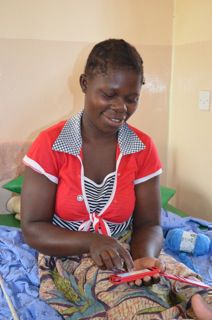 These are women who have had problems giving birth. They not only lose their baby but are damaged – and become incontinent. As a result they are often rejected by the village society and treated like “modern day lepers”. I met one woman who got a fistula as she gave birth 45 years ago. Her whole life changed, as she suffered first the trauma of losing a baby and then being rejected by all around her. The operation takes about three hours, but all the ladies need to be in hospital for a month. Their lives are transformed in the most profound way. EuroTalk have donated software and gadgets for these ladies to use while in hospital. These gadgets had preinstalled language learning and maths apps in English and Chichewa, as well as Malawian music, photos, video clips, lesson plans etc.
These are women who have had problems giving birth. They not only lose their baby but are damaged – and become incontinent. As a result they are often rejected by the village society and treated like “modern day lepers”. I met one woman who got a fistula as she gave birth 45 years ago. Her whole life changed, as she suffered first the trauma of losing a baby and then being rejected by all around her. The operation takes about three hours, but all the ladies need to be in hospital for a month. Their lives are transformed in the most profound way. EuroTalk have donated software and gadgets for these ladies to use while in hospital. These gadgets had preinstalled language learning and maths apps in English and Chichewa, as well as Malawian music, photos, video clips, lesson plans etc.
The hospital anaesthetist has written:
“… the mothers really like the iPods to the extent that when I am busy they even call for them. Some of our young patients are turning into teachers of elderly patients.”
We are planning an update to the digital resources for the school and the hospital early next year.
I also met with members of the Scottish Government, who were visiting Malawi. The SG and EuroTalk are jointly funding the devices and software for these gadgets to go into 30 schools. It’s a really exciting project!
On a personal note, I was really encouraged by this visit. It follows so much work done by so many people. The potential for low cost digital devices and software in local languages to deliver education is enormous. Thank you to so many at EuroTalk, past and present, who have turned ideas into a reality.
Andrew (EuroTalk Managing Director)
Is it OK to be Monolingual?
When England’s GCSE results came out at the end of August the British press were quick to report on the declining numbers of students taking the qualification in a foreign language: 12% fewer students than in 2010 sat the exam, and this is part of a continuing downward trend over the last few years. The vast majority took their GCSE in French, followed at some distance by Spanish and then German. Even the modest numbers taking Mandarin Chinese and Arabic have tailed off.
So, does this mean that we are well and truly on the road to become a nation of monolinguals, at ease communicating with the world in English, and more than happy to leave our dirty work to translators, interpreters and other specialists in the field? And does it matter?
A reason many UK experts state for learning a foreign language – the utilitarian one – suggests that having a language is good for business. However, I doubt that this has really had much of a detrimental effect on the bottom line of UK plc over the years and it is certainly not a motivating factor in persuading a 13 year old to learn Spanish. Although many employers prize a language qualification, the fact is that most jobs don’t require one.
So what about the appreciation of a country’s culture? Do you really need a knowledge of Italian to appreciate Renaissance art? Or of Chinese to understand the triumphs of the Ming Dynasty? It is entirely possible to promote awareness of these subjects in English.
I do think there are powerful reasons why young people should learn a language and the factors of interest to teenagers – the social ones, the sheer fun of it, the intrinsic joy of reaching into another world – are well set out at www.whystudylanguages.ac.uk. The question is: should all children be forced to take a language up to the age of 16?
Perhaps not all of them, if it depends on our current examination system and the knowledge it equips them with. That said, there are changes afoot in the secondary syllabus, and alternative language programs are also being pioneered in the UK. One of these works like music, on the basis of awarding progress through a step-by-step grades system.
And if formal education fails, many people find ways of acquiring language skills later in life, when they have a clearer idea of what they need to learn and why.
Steve
